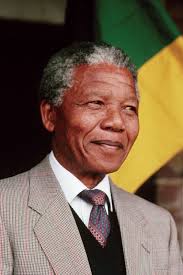[My views on Madiba's legacy to follow later in the day. Unlike our former Prime Minister of 23 years, he is a giant among men, someone of Gandhian proportions. Mahatma Gandhi was a South African lawyer fighting human rights there before he left for India where he subsequently led the Indian Independence movement and became the Spiritual Father of Modern India. I associate these words--Honour, Duty, and Country--with this great South African. More to come. Thanks for your patience--Din Merican]
The Legacy of Nelson Mandela, the Giant of South Africa
by Karim Raslan (07-02-13) @http://www.thestar.com.my
Malaysia has played a pivotal role in investing in South Africa after it opened up to the world following the end of Apartheid.
 THE life of Nelson Mandela, the Giant of South Africa, is drawing to a close.His passing – if and when it occurs – will mark the end of an era. Besides being an icon of reconciliation and hope, Mandela’s rise arguably also opened Africa to the world, including Malaysia.
THE life of Nelson Mandela, the Giant of South Africa, is drawing to a close.His passing – if and when it occurs – will mark the end of an era. Besides being an icon of reconciliation and hope, Mandela’s rise arguably also opened Africa to the world, including Malaysia.
MAS was after all the first South-East Asian airline to fly to South Africa after the end of apartheid.It was estimated in 1998 (just before Mandela left office) that Malaysia had invested almost US$660mil (RM2bil) in South Africa, nearly 21% of the latter’s total foreign direct investment (FDI).
Indeed, Malaysia is now the largest source of developing-country FDI into Africa, with a 2011 FDI stock of US$19bil (RM59.1bil), mostly in agribusiness and finance.
Prime Minister Datuk Seri Najib Tun Razak had this past weekend led a 100-strong delegation to Dar Es Salaam, Tanzania to promote trade and investment via the Global Smart Partnership Dialogue (GSPD).
This came just as US President Barack Obama embarked on his own African sojourn – including Senegal, South Africa and Tanzania as well.
I like to think that I’m a trailblazer of sorts in Malaysia’s push into Africa.Back in the mid-1990s, I was fortunate enough to spend many years travelling to South Africa, advising clients in Johannesburg and Cape Town.
It was an exhilarating period in the country’s history as it emerged from 46 years of apartheid into the full-on embrace of multiracial democracy under the aegis of the great Madiba.
Many South Africans – black and white – were interested in how they might replicate Malaysia’s New Economic Policy (NEP). For all its many shortcomings, it’s remarkable how the NEP was and still is regarded as a revolutionary experiment abroad.
Regrettably, the promise of post-apartheid South Africa has dimmed.The majority black African community appears trapped in the past – many still stuck in what were once-segregated “homelands” with limited resources and opportunities, excluded from the country’s agricultural and mineral riches.
With a soaring Gini co-efficient rating of 0.7 and grinding poverty, it’s hard to see how it can move forward despite its economy growing by 2.5% in 2012.
Moreover, the positive discrimination policies adopted by the African National Congress (ANC) government have merely transferred wealth to a privileged black African elite, with plutocrats like Cyril Ramaphosa and Tokyo Sexwale among the most blatant beneficiaries.
Having become capitalists themselves, the new black elite has in turn become tough and unrelenting bosses – witness the shocking apartheid-era type shootings last year at the Marikana mines dispute.
Nonetheless, 20 years ago, Mandela’s wisdom and humanity had an extraordinary impact on his deeply-divided nation.
Having endured 27 years in prison, he emerged a titan – a figure of moral authority – who forgave those who imprisoned him and mistreated his people, while never forgetting their crimes.
His decision to create the Truth and Reconciliation Commission (TRC) was a powerful reminder of the need for not only closure but also moral censure, even though it was not empowered to impose actual punishment.
While it has been criticised as ineffective, the TRC was historic as it gave a voice to both the victims and perpetrators of apartheid. Nothing was forgotten or swept under the rug.
Mandela moreover understood the importance of the grand gesture in bridging the unbridgeable, such as his support for South Africa’s then white-dominated Springbok rugby union team at the 1995 World Cup. This was immortalised in the 2009 film Invictus.
Mandela’s bold move showed both the world and South Africans themselves that they could be “one”. It was controversial – especially within the black community – but Mandela knew that statesmanship requires more than pandering to one’s base.Of course, the reality of governing has since made South Africa more difficult to run.
Redressing age-old grievances is impossible as long as realistic land reform does not take place. For all the talk of a “Rainbow Nation”, wealth remains concentrated in the hands of the white minority and entrenched ANC apparatchiks.
It must be said, however, that anger at the perceived corruption and incompetence of the ANC is now cutting across ethnic boundaries. It is unclear how long the ANC can stay in power on the back of Madiba’s legacy once he does leave this world; if it can truly reinvent itself and deliver a “Better life for all” as its slogans promise.
“National reconciliation”, it would seem, is becoming all the more fraught in South Africa as old resentments fester and new ones spread.It’s hard building a nation where – to paraphrase emerging markets guru Ruchir Sharma – everyone thinks they are a victim. But I suppose this is something Malaysians know all too well. -Din Merican



No comments:
Post a Comment
Note: Only a member of this blog may post a comment.